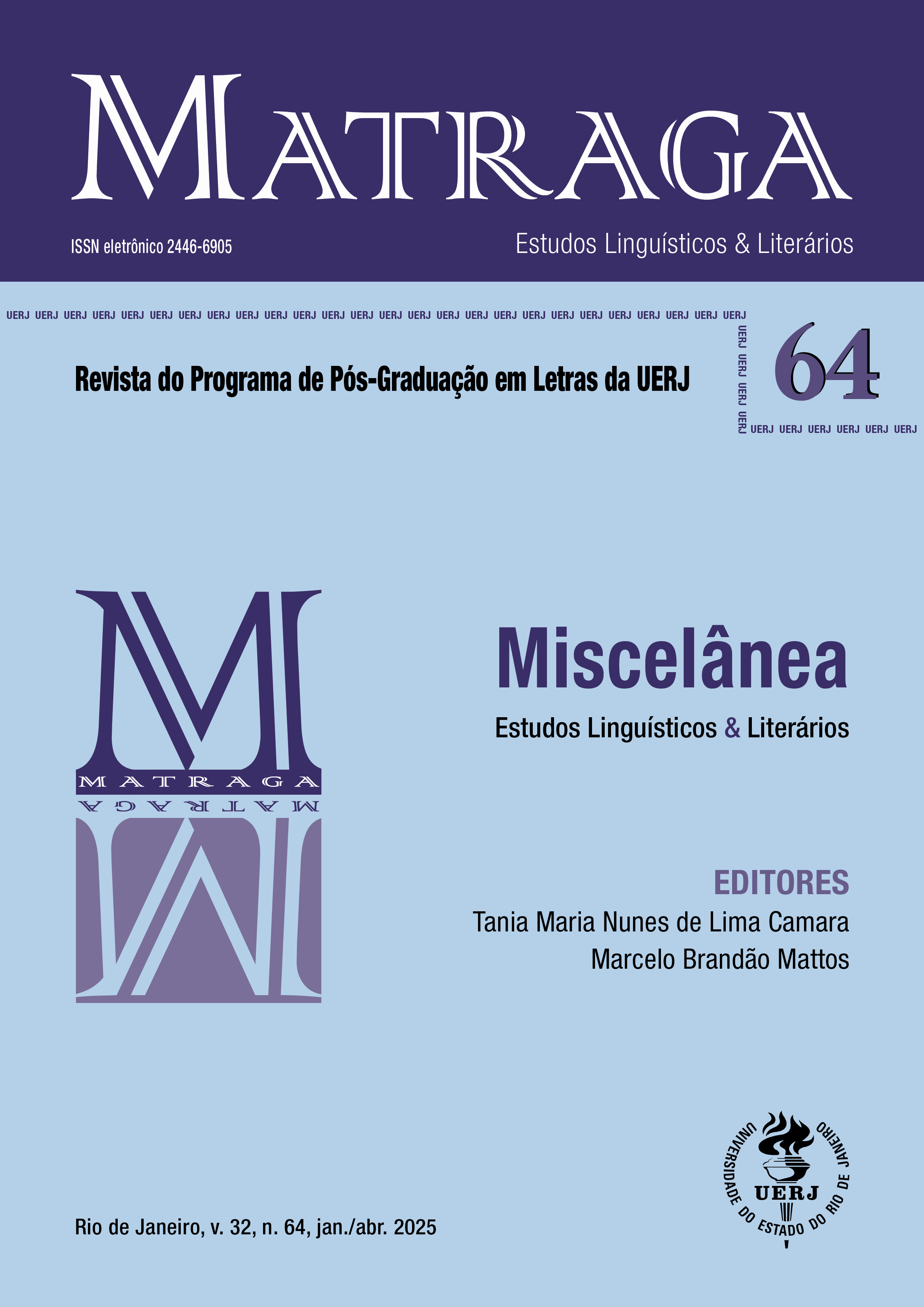“You have breathed the same atom as Gandhi”: an Appraisal System analysis of science popularization strategies on TikTok
DOI:
https://doi.org/10.12957/matraga.2025.85487Keywords:
Systemic Functional Linguistics, Appraisal, Scientific Divulgation, TikTok, Pandemic.Abstract
During the pandemic, social media played an important role in combating misinformation. In the Brazilian context, the profile Fatos Curiosos com Antonio Miranda stands out, created in 2020 by student and tiktoker Antonio Miranda, which mixes creative video editions with subjects from the science area. In this article, we investigated the most liked and commented video from this profile, verifying the discursive strategies adopted to interact with viewers and explain, in an accessible way, supposedly complex content, with a view to popularizing science. The theoretical framework used is the Appraisal System (Martin e White 2005). The results point to the predominance of dialogical contraction, with the erasure of sources, explicit authorial interventions, construction of assertive evaluations and suppression of discordant voices, attenuated by subjective, emotional and suspenseful reactions at the opening and closing of the video, a strategy that seems arouse curiosity and maintain the attention of viewers.
Downloads
References
BAREFOOT, D.; SZABO, J. Manual de marketing em mídias sociais. São Paulo: Novatec, 2010.
BUENO, W. da C. Jornalismo Científico no Brasil: os compromissos de uma prática dependente. Tese (Dou- torado em Ciências da Comunicação) – Escola de Comunicação e Artes, Universidade de São Paulo, São Paulo, 1984.
BUENO, W. C. A divulgação científica no universo digital: o protagonismo dos portais, blogs e mídias sociais. In: PORTO, C.; OLIVEIRA, K. E.; ROSA F. (Orgs.). Produção e difusão de ciência na cibercultura: narrati- vas em múltiplos olhares [online]. Ilhéus: Editus, 2018. p. 55-67.
FREITAS, T.; ROCHA, M. Divulgação científica nas mídias sociais: estratégias de comunicação para pesqui- sadores e cientistas iniciantes no Instagram. Rio de Janeiro: UFRJ, 2022.
GOMES, T. A.; CRESPO, N. D. de O. Análise de vídeos de ciências da natureza no TikTok. Comunicação & Educação, [S. l.] v. 28, n.1, p.83-95, 2023. DOI: 10.11606/issn.2316-9125.v28i1p83-95.
GONÇALVES-SEGUNDO, P. R. Caminhos para um ensino funcional de gramática orientado ao texto: pro- nomes pessoais e adjetivos em perspectiva intersubjetiva. Trab. Ling. Aplic., Campinas, v.56, n.1, p.139-162, jan./abr. 2017.
HALLIDAY, M. A. K.; MATTHIESSEN, C. M. I. An Introduction to Functional Grammar. London: Rout- ledge, 2004.
LEMOS, R.; SANTAELLA, L. Redes sociais digitais: a cognição conectiva do Twitter. São Paulo: Paulus, 2010.
MARTIN, J. R.; ROSE, D. Working with discourse: meaning beyond the clause. London: Continuum, 2007.
MARTIN, J.; WHITE, P. The language of evaluation: appraisal in English. New York: Palgrave, 2005.
MASSARANI, L. et al. O que os jovens brasileiros pensam da ciência e da tecnologia: pesquisa realizada pelo Instituto Nacional de Ciência e Tecnologia em Comunicação Pública da Ciência e Tecnologia (INCT-
-CPCT). Rio de Janeiro: Fiocruz/COC; INCT-CPCT, 2021.
OLIVEIRA, J.M. de. Ciência e divulgação científica: reflexões sobre o processo de produção e socialização do saber. Periodística, v. 11, p. 111-124, 2007.
SANTOS, D. A. dos. “Fala, galera”: quem são e o que pensam divulgadores científicos brasileiros no YouTube. Dissertação (Mestrado em Divulgação da Ciência, Tecnologia e Saúde) – Casa de Oswaldo Cruz, Fundação Oswaldo Cruz. Rio de Janeiro, 2021.
SUGIMOTO, C. R.; THELWALL, M. Scholars on Soap Boxes: Science Communication and Dissemination in TED Videos. Journal of the American Society for Information Science and Technology, v. 64, n. 4, p. 663-674, 2013.
VIANNA, S. C. Divulgação científica e mídias digitais: respostas emocionais de adolescentes frente à pan- demia da Covid-19. Dissertação (Mestrado em Educação) – Programa de Pós-Graduação em Educação, Uni- versidade Federal do Triângulo Mineiro. Uberaba, 2023.
WHITE, P. Valoração: a linguagem da avaliação e da perspectiva. Linguagem em (Dis)curso - LemD, Tuba- rão, v.4, p.178-205, 2004.
Downloads
Published
How to Cite
Issue
Section
License

This work is licensed under a Creative Commons Attribution-NonCommercial 4.0 International License.
Authorization
Matraga – Scientific Journal of the Post-graduate Program in Arts and Humanities of UERJ is authorized to publish the article submitted here, if it is accepted for online publication. It is attested that the contribution is original, that it is not being submitted to another publisher for publication, and that this statement is the expression of truth.
The works published in Matraga's virtual space – Scientific Journal of the Post-graduate Program in Arts and Humanities of UERJ will be automatically transferred, and your copyright is reserved to Matraga. Its reproduction, in whole or in part, is conditional on the citation of the authors and the data of the publication.

Matraga uses license Creative Commons - Attribution-Non-Commercial 4.0 International.





